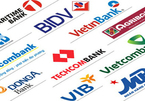
Vietnam’s authorities should work with rating agencies to prevent a possible downgrade of the country’s sovereign rating, which could have negative impacts on the financial system and the capital inflows, according to economist Nguyen Tri Hieu.
In early October, Moody’s placed Vietnam’s Ba3 local and foreign currency issuer and senior unsecured ratings of the government of Vietnam under review for downgrade. The decision was due to institutional deficiencies that led to delayed payments on an obligation by the government.
Shortly after the announcement, Moody’s continued to place the ratings of 17 Vietnamese banks on review for downgrade. “The review of the banks' ratings is driven purely by the sovereign rating action, and does not reflect a weakening of the banks' standalone financial profiles,” stated Moody’s in a statement.
Among those banks that subject to Moody’s review, there are four state-run banks, namely Vietnam Bank for Agriculture & Rural Development (Agribank), Vietnam JSC Bank for Industry and Trade (VietinBank), Bank for Foreign Trade of Vietnam (Vietcombank), and Bank for Investment and Development of Vietnam (BIDV).
The rest are commercial banks, including some of Vietnam’s leading names, such as Vietnam Technological and Commercial Joint Stock Bank (Techcombank), Ho Chi Minh City Development JSC Bank (HDBank), Asia Commercial Bank (ACB), and Vietnam International Bank (VIB), among others.
The move put the banks in a difficult situation, particularly those looking for market expansion by issuing international bonds, i.e. Saigon - Hanoi Commercial Joint Stock Bank (SHB) and Tien Phong Commercial Joint Stock Bank (TPBank), with plan of issuing bonds worth US$500 million and US$200 million in international markets, respectively.
Lower ratings would lead to an increase in interest rates for bonds, as foreign investors look for higher rates for risky loans.
In responding to Moody’s announcement, Vietnam’s Ministry of Finance said the obligation was guaranteed by the government, meaning not a direct obligation.
The ministry argued that Moody’s decision, which was based on a single incident, is improper, and requested the rating agency to reconsider the issue.
World Bank economist Jacques Morisset said a number of reasons are behind a lower sovereign rating, including a major capital outflow, high inflation rate, low foreign exchange reserves, among others.
For Vietnam, the issue is not the lack of money to pay debt, but the inefficient coordination among government agencies, a point that Vietnam must improve on, said Morisset.
Vice General Director of Vietcombank Nguyen Thanh Tung said a lower sovereign rating will automatically lead to banks’ lower ratings.
“We need to prove to rating agencies that Vietnam’s economy is growing at a healthy rate, and there is no reason for a downgrade of sovereign rating,” Tung stated.
An analysis from brokerage firm BSC said Vietnam is fully capable of meeting payment obligations, given its large foreign exchange reserves. However, Moody’s upcoming review would focus on whether weaknesses in financial regulatory could lead to delay in payment.
BSC expected Vietnam’s government agencies to closely work with Moody’s to ensure no change to its Ba3 rating. Hanoitimes
Thao Nguyen - Nguyen Tung

Moody's ponders downgrading 17 Vietnamese banks
The agency will unlikely upgrade the ratings of the 17 banks, because their ratings are on review for downgrade.

Moody's decision to place VN’s Ba3 rating under review for downgrade is improper: Vietnamese Finance Ministry
Vietnam's long-term foreign currency (FC) bond ceiling at Ba1, its long-term FC deposit ceiling at B1, and its local currency bond and deposit ceilings at Baa3 are unchanged.
 For Vietnam, the issue is not the lack of money to pay debt, but the inefficient coordination among government agencies, a point that Vietnam must improve on.
For Vietnam, the issue is not the lack of money to pay debt, but the inefficient coordination among government agencies, a point that Vietnam must improve on.